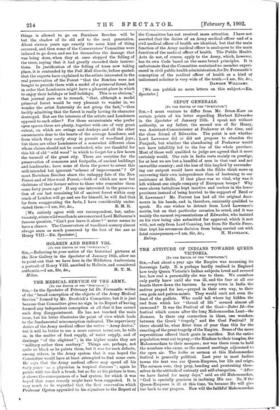THE MEDICAL SERVICE OF THE ARMY.
[To THE EDITOR OF THE "SPECTATOE."]
Sin,—In the Spectator of February 1st Dr. Fremantle writes of the "broad conception of the objects of the Army Medical Service" formed by Mr. Brodrick's Committee, but it is just because that Committee gives no sign in its Report of having formed any independent conception at all that it has caused such deep disappointment. He has not touched the main issue, but his letter illustrates the point of view which leads to the fundamental misconception indicated. The supervisory duties of the Army medical officer (he writes "Army doctor," but it will be better to use a more correct term) are, he tells as, in the matter of food supply, of water supply, and of drainage "of the slightest" ; in the higher ranks they are " military rather than sanitary." Things are, perhaps, not quite so black as he paints them, but it was for such defects, among others, in the Army system that it was hoped the Committee would have at least attempted to find some cure. He says that the Army medical officer may spend all his early years "as a physician in tropical diseases " ; again he paints with too dark a brush, but so far as his picture is true, it shows the consequences of a bad system, for which it was hoped that some remedy might have been suggested. It is very much to be regretted that the first reservation which Professor Ozston appended to his signature to the Report of
the Committee has not received more attention. I have not asserted that the duties of an Army medical officer and of a civil medical officer of health are identical, but that the main function of the Army medical officer is analogous to the main function of the medical officer of health. The Public Health Acts do not, of course, apply to the Army, which, however, has its own Code based on the same broad principles. It is unfortunate that the Committee contained no member experi- enced in civil public health administration, for Dr. Fremantle's conception of the medical officer of health as a kind of unlicensed solicitor is very wide of the truth.—I am, Sir, &c.,
DAWSON WILLIAMS.
[We can publish no more letters on this subject.—ED. Spectator.]










































 Previous page
Previous page